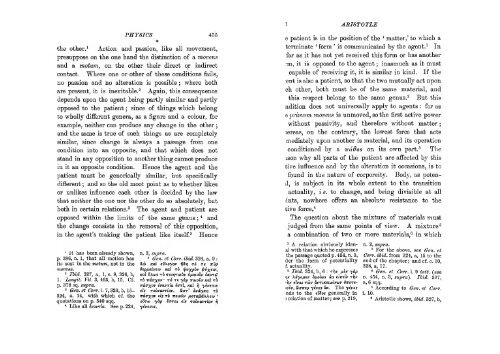ARISTOTLE AND THE EARLIER PERIPATETICS vol.I by Eduard Zeller, B.F.C.Costelloe 1897
MACEDONIA is GREECE and will always be GREECE- (if they are desperate to steal a name, Monkeydonkeys suits them just fine) ΚΑΤΩ ΤΟ ΠΡΟΔΟΤΙΚΟ "ΣΥΝΤΑΓΜΑΤΙΚΟ ΤΟΞΟ"!!! Strabo – “Geography” “There remain of Europe, first, Macedonia and the parts of Thrace that are contiguous to it and extend as far as Byzantium; secondly, Greece; and thirdly, the islands that are close by. Macedonia, of course, is a part of Greece, yet now, since I am following the nature and shape of the places geographically, I have decided to classify it apart from the rest of Greece and to join it with that part of Thrace which borders on it and extends as far as the mouth of the Euxine and the Propontis. Then, a little further on, Strabo mentions Cypsela and the Hebrus River, and also describes a sort of parallelogram in which the whole of Macedonia lies.” (Strab. 7.fragments.9) ΚΚΕ, ΚΝΕ, ΟΝΝΕΔ, ΑΓΟΡΑ,ΕΚΚΛΗΣΙΑ,ΝΕΑ,ΦΩΝΗ,ΦΕΚ,ΝΟΜΟΣ,LIFO,MACEDONIA, ALEXANDER, GREECE,IKEA
MACEDONIA is GREECE and will always be GREECE- (if they are desperate to steal a name, Monkeydonkeys suits them just fine)
ΚΑΤΩ ΤΟ ΠΡΟΔΟΤΙΚΟ "ΣΥΝΤΑΓΜΑΤΙΚΟ ΤΟΞΟ"!!!
Strabo – “Geography”
“There remain of Europe, first, Macedonia and the parts of Thrace that are contiguous to it and extend as far as Byzantium; secondly, Greece; and thirdly, the islands that are close by. Macedonia, of course, is a part of Greece, yet now, since I am following the nature and shape of the places geographically, I have decided to classify it apart from the rest of Greece and to join it with that part of Thrace which borders on it and extends as far as the mouth of the Euxine and the Propontis. Then, a little further on, Strabo mentions Cypsela and the Hebrus River, and also describes a sort of parallelogram in which the whole of Macedonia lies.”
(Strab. 7.fragments.9)
ΚΚΕ, ΚΝΕ, ΟΝΝΕΔ, ΑΓΟΡΑ,ΕΚΚΛΗΣΙΑ,ΝΕΑ,ΦΩΝΗ,ΦΕΚ,ΝΟΜΟΣ,LIFO,MACEDONIA, ALEXANDER, GREECE,IKEA
You also want an ePaper? Increase the reach of your titles
YUMPU automatically turns print PDFs into web optimized ePapers that Google loves.
;<br />
;<br />
;<br />
3 <strong>ARISTOTLE</strong><br />
PHYSICS 455<br />
•<br />
the other. 1 Action and passion, like all movement,<br />
presuppose on the one hand the distinction of a movens<br />
and a motum, on the other their direct or indirect<br />
contact. Where one or other of these conditions fails,<br />
no passion and no alteration is possible ; where both<br />
are present, it is inevitable. 2 Again, this consequence<br />
depends upon the agent being partly similar and partlyopposed<br />
to the patient ; since of things which belong<br />
to wholly different genera, as a figure and a colour, for<br />
example, neither can produce any change in the other<br />
and the same is true of such things as are completely<br />
similar, since change is always a passage from one<br />
condition into an opposite, and that which does not<br />
stand in any opposition to another thing cannot produce<br />
in it an opposite condition. Hence the agent and the<br />
patient must be generically similar, but specifically<br />
different ;<br />
and so the old moot point as to whether likes<br />
or unlikes influence each other is decided <strong>by</strong> the law<br />
that neither the one nor the other do so<br />
absolutely, but<br />
both in certain relations. 3 The agent and patient are<br />
opposed within the limits of the same genus<br />
4<br />
and<br />
the change consists in the removal of this opposition,<br />
in the agent's making the patient like itself. 5 Hence<br />
e patient is in the position of the ' matter,' to which a<br />
terminate 'form ' is communicated <strong>by</strong> the agent. 1 In<br />
far as it has not yet received this form or has another<br />
I'm, it is opposed to the agent ; inasmuch as it must<br />
capable of receiving it, it is similar in kind. If the<br />
ent is also a patient, so that the two mutually act upon<br />
ch other, both must be of the same material, and<br />
this respect belong to the same genus. 2 But this<br />
ndition does not universally apply to agents : for as<br />
e primum movens is unmoved, so the first active power<br />
without passivity, and therefore without matter<br />
lereas, on the contrary, the lowest force that acts<br />
mediately upon another is material, and its operation<br />
conditioned <strong>by</strong> a iraQos on its own part. 3 The<br />
ison why all parts of the patient are affected <strong>by</strong> this<br />
tive influence and <strong>by</strong> the alteration it occasions, is to<br />
found in the nature of corporeity. Body, as potenil,<br />
is subject in its whole extent to the transition<br />
actuality, % e. to change, and being divisible at all<br />
lints, nowhere offers an absolute resistance to the<br />
tive force. 4<br />
The question about the mixture of materials must<br />
judged from the same points of view. A mixture 5<br />
a combination of two or more materials, 6 in which<br />
1<br />
A relation obviously iden- n. 2, supra.<br />
1<br />
It has been already shown, n. 3, supra.<br />
p. 386, n. 1, that all motion has<br />
5<br />
Gen. et Corr. Hid. 324, a, 9 :<br />
its seat in the motum, not in the 5i6 Kal eihoyov
















